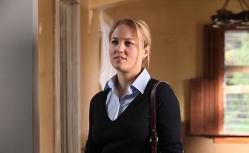In Tuesday’s episode of Parenthood—spoiler alert, etc—power-lawyer and mom to one biological kid and one newly adopted kid Julia Braverman-Graham cracked. After screwing up at work, screwing up at home, suffering a panic attack, and facing angry bosses who doubt her commitment to the partner-track, Julia makes a huge move: She quits her job. Her circumstances are particular, but Julia’s part of a larger trend: pop-culture moms who take their jobs and shove ‘em when work starts to interfere with family life.
Quitting is often presented as a cathartic gesture. In the second Sex and the City movie, Miranda finds herself missing school event after school event for her son Brady, and faced with an unpleasant new managing partner who can’t understand her desire to have a work-life balance, she quits. And as she marches off to Brady’s school like all the other parents, Miranda feels—what’s the word? Oh yes: liberated. But being the fantasy that the franchise is, after a refreshing vacation in Abu Dhabi, Miranda returns to work at the kind of family-friendly-but-high-powered practice that could only be dreamed up in the bedazzled lab of Michael Patrick King. No harm to her career, no real need to struggle with work-life balance, no foul.
Before Miranda, there was Nancy Burton on Ed, NBC’s early-aughts show about a lawyer who moves back to his hometown to restart his life after a series of romantic and professional failures. Nancy, the wife of the main character’s best friend, quit her job when she realized that she was missing important moments in her young daughter’s development. So she spent a period as a stay-at-home mother, and then eventually returned to work in a job that let her manage both family and professional obligations. Problems solved!
It’s not clear yet whether Julia will spend some time at home, immediately find a more manageable yet still fulfilling job, or will spend some time at home and then easily find a more manageable yet still fulfilling job. But I doubt we will get to see any of the substantial “having it all” difficulties that real-life Julia Bravermans face, particularly how tough-to-impossible it can be to get back into the working world after taking time off to raise a family (especially in corporate law) and how that family gets by without mom’s primary-breadwinner salary. To be fair, Parenthood has in the past explored the emotional struggles that go along with unemployment, when Julia’s older brother Adam was fired from the business he’d run for 15 years. But in that plot, though Adam’s family ran through their savings so Adam could start a new business, they still stayed in their handsome home, found a way to pay for their son’s Asperger treatment and still managed to send their daughter to Cornell.
As Julia’s story continues, Parenthood would be wise to take a page from the first season finale of Roseanne, in which Roseanne, facing sexual harassment and impossible quotas at work from a new factory manager (played by Fred Thompson), decides to leave her job because it’s making her miserable at home as well. The show took Roseanne’s happiness seriously, but it treated the decision as a genuinely risky one. When Roseanne’s husband Dan (John Goodman) suggested she quit, Roseanne told him, “I mean, I’d lose everything. I wouldn’t get any hospitalization. I couldn’t get any kind of unemployment. And the kids could never get sick, or grow.” Though she eventually decided to leave the factory, and her fellow shop-floor employees followed her in protest, the season ended with a mix of shakiness and celebration. Roseanne may have given her colleagues the courage to get out, but her moment of righteous indignation came with real costs, and a long struggle to find a new job that was chronicled over the next season.
I hope Parenthood is as honest, rather than pretending that the lifestyle Julia provided for her family will continue without adjustments or consequences. Giving up one-half of the work-life equation doesn’t actually mean the other half get easier.
